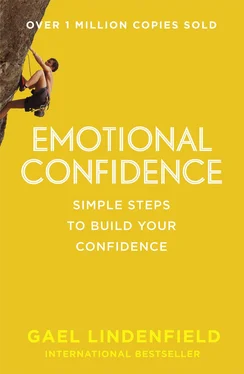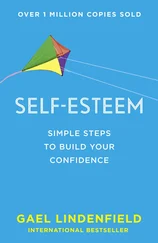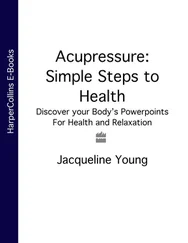Enjoy the journey, and be generous with the breaks and treats!
Why We Need Emotional Confidence
For many of you reading this book, taking on the challenge of giving yourself emotional confidence may be the hardest kind of personal development work you ever do. By comparison, it is relatively easy to learn new skills (such as how to give professional presentations or dress in an eye-catching manner) and relatively easy to learn how to change specific aspects of your behaviour (for example, giving and taking criticism in a constructive and effective way). But to reach the point where you feel confident that you will always have enough emotional control to be able to use this learning whenever you choose can be a much harder (and a more lengthy) process.
I first became aware of this fact when I started teaching assertiveness training. I was thrilled to find this new technique of helping people. Its strategies were quick to learn, great fun to teach and, as I knew from my own personal life, undoubtedly effective. People would leave my courses on a great ‘high’ because in eight short sessions they had acquired the social tools which everyone else around them seemed to have and which they had longed for all their life. They now had a bag of tried-and-tested ‘tricks’ to ensure that they could make their voice heard, and stop others in their tracks when they put them down or didn’t respect their privacy or rights. But after a while I began to notice that many people couldn’t use these amazing new tools simply because their emotions stopped them from doing so. They would tell me that, although they knew their assertive strategies would work, they often felt too frightened, too guilty, too angry, too ashamed or even too choked up with love and compassion to use them. Later I found that exactly the same blocks would get in the way of people using many other personal and social skills which they fully accepted could transform their ability, for example, to be a better parent, more efficient at their work or closer to their partner.
Unfortunately, for many of the people I have worked with I have found that it can take much longer than eight short sessions to build the kind of emotional confidence they need to ‘underpin’ all their other personal development work. For someone whose problems are rooted in painful childhood hurts or persistent faulty mental programming, it can take two or more years to notice a substantial improvement. Compared with the length of time it may have taken for their problems to develop and their expected lifespan, you could easily argue that this recovery period is not in reality very long. But I certainly know that it often feels too long to the person struggling in the heat of their own emotional battlefield.
I’ve written this following list to remind you of all the rewards which emotional confidence can bring. Read it now to give your motivation an immediate boost, and then at any time when ‘the going gets tough’ and you may be tempted to give up on the challenge you have set yourself.
25 Compelling Reasons for Building and Maintaining Emotional Confidence
You can expect the following benefits from having sound emotional confidence:
1. Increased self-respectbecause your feelings are not ‘making’ you act in ways which are against your values
2. Firmer sense of personal identitybecause you can be more consistent in the way you react and behave
3. An ability to use your brain more efficientlybecause you will have better concentration, a more efficient memory and be able to switch more easily between your left, logical brain and your right, intuitive and emotional brain
4. Sustain your motivationbecause you can readily kindle positive feelings to keep you excited about your goals, and control negative feelings from intruding on your progress when you meet setbacks
5. Save timebecause you can make quicker decisions and get into action more rapidly by curtailing unnecessary worry and panic
6. Make better decisionsbecause you will be aware of the influence of your feelings on your reasoning powers
7. Become a better team-playerbecause you will be able to communicate more effectively and maintain your ‘working’ relationships in better order, containing any feelings (such as envy) when necessary
8. Be more able to work on your own successfullybecause you will not fear loneliness and will know how to keep yourself charged with positive emotion
9. Thrive on changebecause you can control the inevitable emotions that accompany you through both welcome and unwelcome transitions
10. Take more risksbecause you know you can think through consequences without being hampered by your emotional reasoning, and can be confident that you can repair your own hurt and disappointment if you should make a mistake
11. Be more persuasivein asking for what you want because you summon up just the right degree of appropriate emotion to give extra power to your message and ‘hook’ your audience
12. Save moneybecause you do not need to become dependent on expensive stress-relievers such as alcohol, nicotine or ‘crash-out holidays’ to revitalize or repair your shattered nerves, and can work more effectively
13. Have the friendships you want and need because you can manage the fear that often accompanies making the first approach, or the guilt that is often triggered when you finish a relationship if it’s no longer meeting your needs
14. Loveand caremore freely because you can trust that your heart will not override your rational mind, are able to heal yourself should you be hurt by the relationship, and are immune to emotional blackmail
15. Have a more rewarding sexual lifebecause you can ‘let go’ knowing that you can control your passion when you want to, and are not too frightened to ask for what you want!
16. Be a better parentbecause you can be more consistent and stable in the way you give love, and more in control of your negative emotions so that they are less likely to hurt your children when they cannot defend themselves. Also you will be better able to help them develop emotional confidence through your role-model and informed guidance
17. Have better physical healthbecause your nervous and immune systems are linked, and pent-up tension from mismanaged emotions puts a strain on your muscles, heart and most other organs
18. Have more controlover your eating habitsbecause eating disorders (eating too much or too little) are undoubtedly more difficult to control when feelings are out of control
19. Drive more safelybecause you can keep calm under pressure and control your frustration and your responses to other people’s ‘road rage’
20. Increase your chances of winning arguments and resolving conflictbecause you have a better chance of being heard when you can put your case across with ‘passion’ while still maintaining control and the ability to think in a rational manner
21. Take more enjoyment from your own and others’ creativitybecause you have freer access to the creative powers and sensitivity of your right brain. You can also allow yourself to get ‘carried away’ by art and music in the full knowledge that you can regain control and rational thought when you choose to do so
22. Have more funbecause you can be spontaneous and give free rein to your excitement and humour, knowing that you can harness it again when you need to ‘settle down’
Читать дальше












